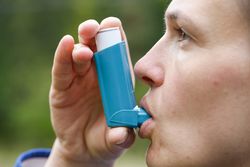Chronic obstructive pulmonary disease (COPD) is a category of illnesses that produce inflamed lungs and blocked airflow. In the United States, COPD is the third leading cause of death by disease. If you or someone you love has recently been diagnosed, it's not uncommon to have a lot of questions about this disease and its treatment options. Below, some of the more frequently asked questions are answered in more detail.
Answers to Common Questions About COPD
What is it?
It’s a group of lung diseases that share the common symptom of breathlessness. Emphysema and chronic bronchitis are two of the more common types of COPD. Emphysema occurs when the air sacs in the lungs are damaged.
Chronic bronchitis is an inflammation of the lining of the bronchial tubes. Signs of either condition include frequent shortness of breath, coughing with or without mucus, wheezing, and chest tightness.
Who does it affect most?
 There are a number of populations at higher risk of developing COPD. Current and former smokers have increased rates because of long-term exposure to cigarette smoke. People with asthma who also smoke are particularly susceptible to the condition.
There are a number of populations at higher risk of developing COPD. Current and former smokers have increased rates because of long-term exposure to cigarette smoke. People with asthma who also smoke are particularly susceptible to the condition.
Being around toxic chemicals can lead to greater COPD risk, such as exposure to secondhand smoke, chemical fumes and vapors, or burning fuel from cooking or heating. COPD has a gradual onset, so more severe symptoms don't usually emerge until after age 40.
What treatments are available?
While it cannot be cured, it can often be managed, so be sure to consult your doctor and follow their treatment plan. Possible therapies worth exploring include bronchodilators, which relax airway muscles, and inhaled steroids, which reduce inflammation, and supplemental oxygen delivered via a portable tank.
Specific, lung capacity-enhancing exercises and stem cell therapies can also benefit COPD patients. To prevent the condition from worsening, it’s best to quit smoking.
How is COPD diagnosed?
Your doctor will assess your symptoms and discuss any exposure to known triggers like cigarette smoke. They may perform a lung function test, which measures the amount of air you breathe in and out and gauges whether the blood is getting sufficient oxygen. In some cases, chest X-rays or CT scans may be ordered to determine the extent of the illness.
For COPD treatment in Long Island, New York City, or anywhere in the Tri-State area, visit Integrative Medicine of New York, PLLC in Garden City. They offer immune system supportive therapies for a variety of conditions, including autoimmune disorders and cancer. Call (516) 759-4200 or visit them online to schedule an appointment.
About the Business
Have a question? Ask the experts!
Send your question


